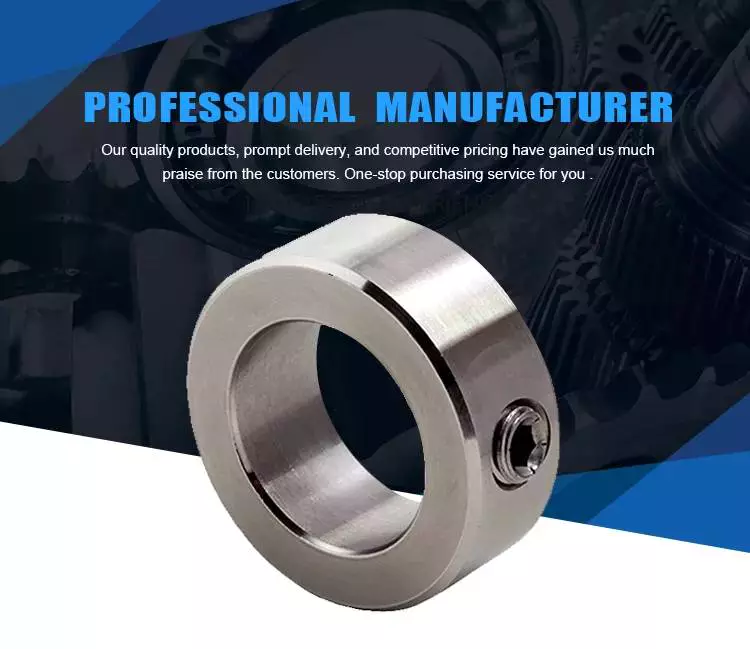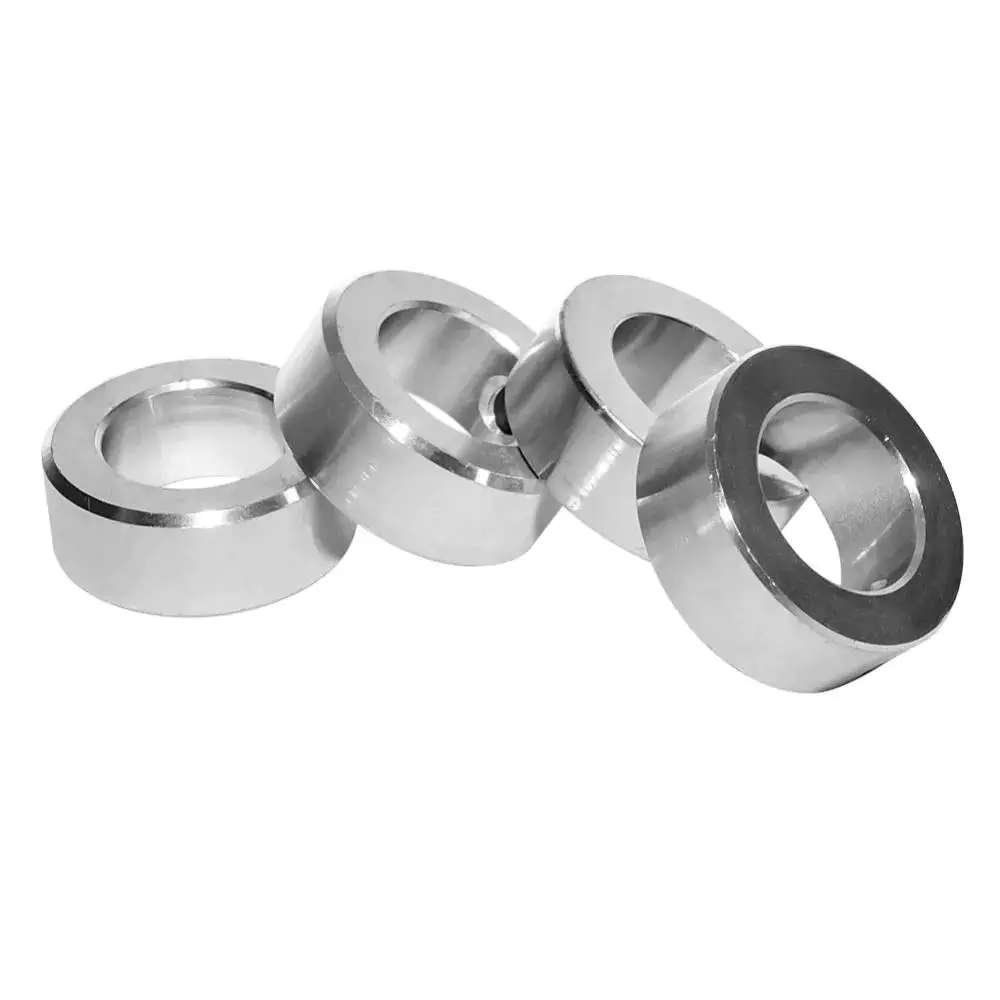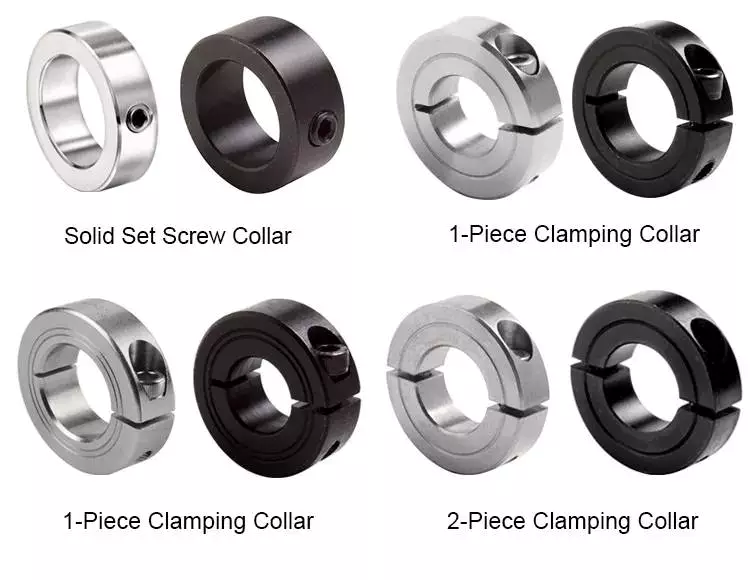Product Description
Product Description
Product Description
Metal Buckle Dog Collar
This new design dog collar made with laminated print webbing, with Zinc alloy kit buckle instead of plastic buckle, Zinc alloy D-ring and slider make our Dog collar Anti-rust ,stronger and unique
If you are searching for a strong dog collar that can be make you and your dog feeling comfortable, this product will fit you the best. Our E-store offers the wide range of dog collar that will serve you and your four-legged friend for a long period of time. High quality zinc alloy snap hook will serve you for a long time, we offer 12 months product warranty
Different sizes for your reference and it’s customized
Please kindly note that all the measurements are made by hand, there are will be a difference of 1-2cm,please subject to the actual sample.
| Size | Webbing Width | Length |
| S | 2.0cm | 28-38cm |
| M | 2.5cm | 38-50cm |
| L | 2.5cm | 46-64cm |
| Product Name | Print Dog Collar |
| Type |
Pet Collar |
| Material |
Polyester,Aluminium Alloy |
| Feature |
Laminated Print, Length Adjustable |
| Application |
Dog |
| Season |
All Season |
| Style |
Sports |
| Place pf Origin |
China |
| Brand Name |
Bettering |
| Size |
S:2.0*28-38cm/M:2.5*38-48cm/L:2.5*46-61cm (unit:cm) |
Metal Buckle Dog Colalr
More Colors for your distinctive favour, make your dog outstanding out of others
/* January 22, 2571 19:08:37 */!function(){function s(e,r){var a,o={};try{e&&e.split(“,”).forEach(function(e,t){e&&(a=e.match(/(.*?):(.*)$/))&&1
| Suitable for: | Dog |
|---|---|
| Material: | Nylon |
| Type: | Buckle Collars |
| Samples: |
US$ 20/Piece
1 Piece(Min.Order) | Order Sample |
|---|
| Customization: |
Available
| Customized Request |
|---|
.shipping-cost-tm .tm-status-off{background: none;padding:0;color: #1470cc}
|
Shipping Cost:
Estimated freight per unit. |
about shipping cost and estimated delivery time. |
|---|
| Payment Method: |
|
|---|---|
|
Initial Payment Full Payment |
| Currency: | US$ |
|---|
| Return&refunds: | You can apply for a refund up to 30 days after receipt of the products. |
|---|
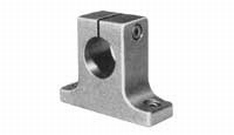
What are the steps for replacing existing collars with aluminum collars in industrial settings?
Replacing existing collars with aluminum collars in industrial settings can be a beneficial upgrade. Here are the steps to follow for a successful replacement:
- 1. Safety Precautions: Before beginning any work, prioritize safety. Ensure the machinery is powered off, and proper lockout/tagout procedures are followed to prevent accidental startup. Wear appropriate safety gear.
- 2. Assessment: Evaluate the condition of the existing collars and the reasons for replacement. Identify any wear and damage that necessitates the change.
- 3. Identify Collar Type: Determine the specific type of aluminum collars that will replace the existing ones. Consider factors like shaft size, collar type (e.g., set screw, clamping, or split collar), and material requirements.
- 4. Gather Tools: Collect the necessary tools and equipment for the replacement process, including wrenches, screwdrivers, and any specialized tools required for the chosen collar type.
- 5. Remove Existing Collars: Carefully disassemble and remove the existing collars from the shafts. Loosen any set screws and detach the collars while ensuring minimal disturbance to the machinery’s alignment.
- 6. Clean and Inspect: Clean the shaft and the surrounding area to remove any debris, rust, or residue. Inspect the shaft for any damage that may affect the performance of the new collars.
- 7. Lubrication: Apply a suitable lubricant to the shaft to reduce friction and aid in the installation of the new aluminum collars. Ensure that the lubricant is compatible with aluminum and the application’s environment.
- 8. Install Aluminum Collars: Slide the new aluminum collars onto the shaft at the desired positions. Follow the manufacturer’s guidelines for installation, whether it involves set screws, clamping mechanisms, or split collar assembly. Tighten the collars securely to the manufacturer’s recommended torque specifications.
- 9. Alignment: Check the alignment of the new collars and ensure they are correctly positioned. Misalignment can lead to operational issues and wear. Make adjustments if necessary.
- 10. Quality Control: Perform quality checks to ensure that the aluminum collars are securely in place and that the machinery operates smoothly. Test the machinery to verify its performance.
- 11. Record Keeping: Maintain records of the replacement process, including the date of replacement, collar specifications, and any adjustments made. This documentation can be valuable for future maintenance and troubleshooting.
- 12. Maintenance Plan: Implement a maintenance plan for the new aluminum collars, including regular inspections and lubrication. This will help extend their service life and ensure optimal performance.
Replacing existing collars with aluminum collars can improve the efficiency and reliability of industrial machinery. Proper installation and maintenance are key to the success of this upgrade.
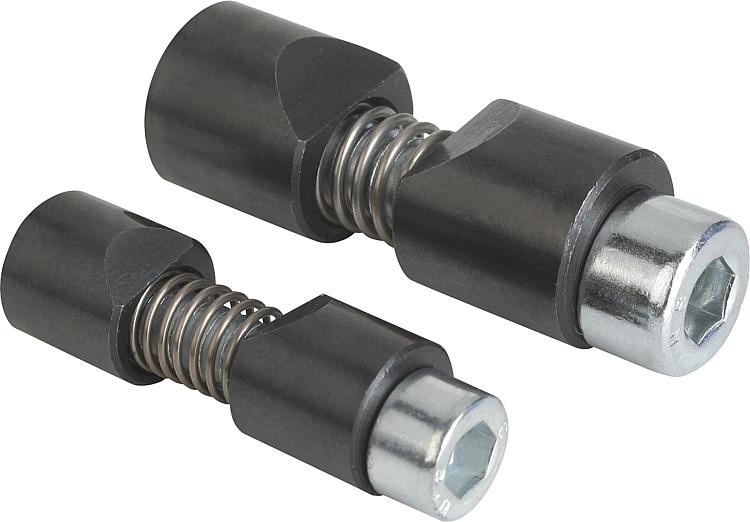
Where can I find tutorials on the correct installation of aluminum collars?
Installing aluminum collars correctly is essential to ensure their effectiveness in mechanical applications. You can find tutorials and guides on the correct installation of aluminum collars through the following sources:
- 1. Manufacturer’s Documentation: Start by checking the official website of the aluminum collar manufacturer. Many manufacturers provide detailed installation guides, instructions, and videos specific to their products.
- 2. YouTube and Video Platforms: Video-sharing platforms like YouTube often host instructional videos on various mechanical components, including collars. Search for videos related to “aluminum collar installation” to find visual tutorials.
- 3. Online Mechanical Forums: Online mechanical forums and communities, such as engineering.stackexchange.com or practicalmachinist.com, may have discussions and threads where experienced users share installation tips and techniques.
- 4. Mechanical Engineering Resources: Academic websites and resources from mechanical engineering institutions may offer guidance on collar installation as part of their educational content.
- 5. Industrial Supply Websites: Websites of industrial supply stores and suppliers often provide resources on product usage. Look for downloadable guides or articles related to collar installation.
- 6. Books and Publications: Mechanical engineering books and publications often include sections on the installation of mechanical components. Consider looking for relevant books in your field of interest.
- 7. Manufacturer’s Customer Support: Contact the manufacturer’s customer support for assistance and guidance. They can provide information, answer questions, and offer specific advice for your collar installation needs.
- 8. In-Person Workshops and Training: Some manufacturers or technical schools offer in-person workshops or training sessions on mechanical component installation, including collars. Check for local training opportunities in your area.
- 9. Professional Organizations: Mechanical engineering and industry-specific professional organizations may have resources, webinars, or seminars on proper installation techniques. Consider joining relevant organizations to access such materials.
When using tutorials for collar installation, ensure that the source is reputable and that the information is up-to-date. Follow the manufacturer’s guidelines closely, and seek expert assistance if you encounter challenges or have specific questions about your installation process. Proper installation is essential to maximize the performance and safety of your mechanical system.

What are the key differences between aluminum collars and other collar materials like stainless steel?
Understanding the differences between aluminum collars and other materials like stainless steel is essential when selecting the right collar for your application. Here are the key distinctions:
| Characteristic | Aluminum Collars | Stainless Steel Collars |
|---|---|---|
| Weight | Aluminum collars are lightweight, making them ideal for applications where weight reduction is crucial. | Stainless steel collars are heavier than aluminum collars, which can be advantageous in some high-stress applications. |
| Corrosion Resistance | Aluminum has natural corrosion resistance due to its oxide layer. It’s suitable for indoor and outdoor applications but may not be ideal for highly corrosive environments. | Stainless steel is known for its excellent corrosion resistance, making it suitable for a wide range of applications, including those exposed to harsh chemicals and saltwater. |
| Machinability | Aluminum is relatively easy to machine, making it suitable for custom collar designs. Machining and fabricating aluminum collars is straightforward. | Stainless steel can be more challenging to machine due to its hardness, but it’s still machinable. Special tools and expertise may be required. |
| Strength | Aluminum collars are less strong than stainless steel collars. They are suitable for applications where high strength is not a primary requirement. | Stainless steel collars offer higher strength and durability, making them suitable for high-stress and heavy-load applications. |
| Magnetic Properties | Aluminum is non-magnetic, making it ideal for applications where magnetic interference is a concern. | Stainless steel can be magnetic or non-magnetic, depending on its composition. This property should be considered in applications sensitive to magnetic fields. |
| Cost | Aluminum collars are generally more cost-effective than stainless steel collars, making them a budget-friendly choice. | Stainless steel collars are often more expensive due to their higher material cost and manufacturing complexity. |
The choice between aluminum and stainless steel collars depends on the specific requirements of your application. Consider factors such as weight, corrosion resistance, strength, and budget constraints when making your selection. It’s essential to select the material that best aligns with the needs of your mechanical application.


editor by Dream 2024-05-09
China best 2″ Aluminum Weightlifting Accessories Lock Barbell Clamp Spring Collar eccentric collar shaft lock
Product Description
Q.Are you a trading company or manufacturing company?
A. Both. We are an integrated company that has both manufacturing and exporting. Manufacturing specifically has been in the industry for 16 years.
Q.Are samples provided to us?
A. Yes
Q.Do you have any MOQ order?
A.Low MOQ.1pc for sample checking is available. We can provide you with 3 Express(FEDEX/DHL/UPS) the lowest discount.
Q.What is your advantage?
A.1.All raw material we choose to use are thoroughly checked and inspected
2.Quality-control department responsible for quality checking in each process along the way.
3.Professional customer service from our sales department
4.We are not simply an exporting company. Our team work closely with each carefully selected manufacturer to ensure all our customers’ demands are met precisely in accordance to the requirements.
5.Communication is key. We have native speakers whom are adept within the industry to answer all your questions promptly and aptly.
6. Fast delivery
Q.How to control the products quality?
A.1.You can arrange the third party quality control service to make spot inspection.
2.We can CZPT the quality assurance agreement.
Q.How to deal with the faulty or refund the faulty products?
A.Firstly, our products are under the supervision of our quality control department and defective rate is less than 0.5%. However, if during the guaranteed period, if faulty parts are found, we will replace with new parts.
Q.When can I get the price?
A. We usually quote within 24 hours after we get your inquiry.
Q.How about the payment term?
A.Our normal payment is 30% advance and 70% balance after copy bill or L/C at sight.
Q. What is your delivery time?
A.Normally, It takes us 15-45 business days for an purchase that’s over our MOQ qty after you confirm the order and received our LC at sight 31% deposit.
/* January 22, 2571 19:08:37 */!function(){function s(e,r){var a,o={};try{e&&e.split(“,”).forEach(function(e,t){e&&(a=e.match(/(.*?):(.*)$/))&&1
| Application: | Indoor |
|---|---|
| Transport Package: | Polybag and CTN |
| Specification: | inner dia-50mm external dia-80mm |
| Trademark: | Enerize |
| Origin: | Nantong |
| Samples: |
US$ 20/Piece
1 Piece(Min.Order) | |
|---|
| Customization: |
Available
| Customized Request |
|---|
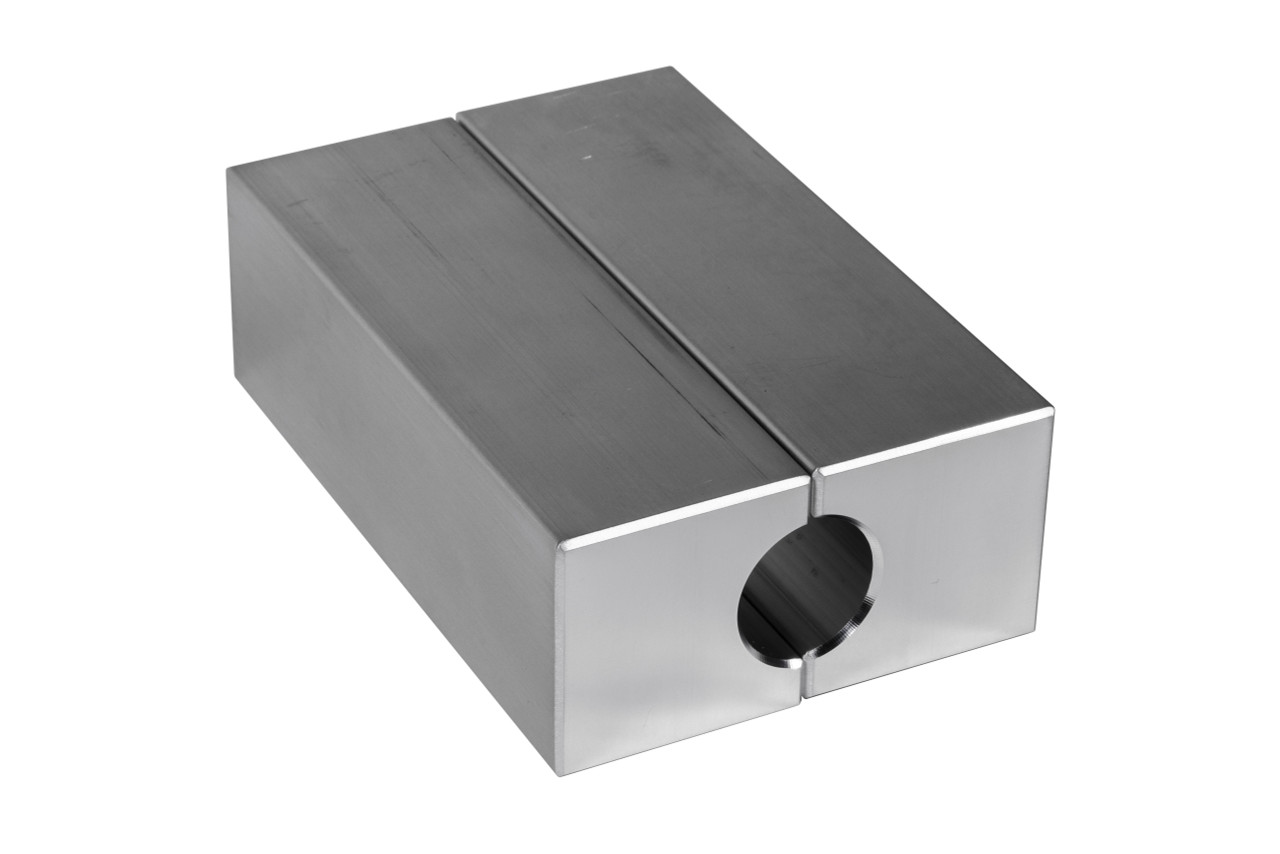
What are the temperature resistance properties of aluminum collars?
The temperature resistance properties of aluminum collars are essential to consider when selecting them for various applications. Here’s an overview of their temperature resistance properties:
- 1. Low to Moderate Temperatures: Aluminum collars are suitable for use in low to moderate-temperature environments. They can generally withstand temperatures ranging from -40°C to 150°C (-40°F to 302°F) without significant deformation or loss of strength.
- 2. Melting Point: Aluminum has a relatively low melting point of around 660.3°C (1,220.5°F). This means that in applications where temperatures approach or exceed this point, aluminum collars are not suitable, as they will undergo structural changes.
- 3. Heat Dissipation: Aluminum has excellent heat dissipation properties. This feature is advantageous in applications where temperature control or dissipation is necessary, such as in electronics or heat exchangers.
- 4. Thermal Expansion: Aluminum collars have a coefficient of thermal expansion (CTE) that should be considered. When exposed to temperature changes, aluminum collars will expand or contract. Proper design and clearances are necessary to accommodate this thermal expansion without compromising the application’s performance.
- 5. Insulation: Aluminum is not an electrical insulator. In applications requiring electrical insulation at higher temperatures, alternative collar materials or insulating components should be used to prevent electrical conduction.
- 6. Protective Coatings: To enhance temperature resistance, some aluminum collars are coated with high-temperature-resistant materials. These coatings can extend their usability in higher-temperature environments.
When considering aluminum collars for specific applications, it’s crucial to assess the expected temperature range and the collar’s compatibility with those conditions. For extreme high-temperature applications, alternative collar materials like stainless steel or other heat-resistant materials may be more suitable.
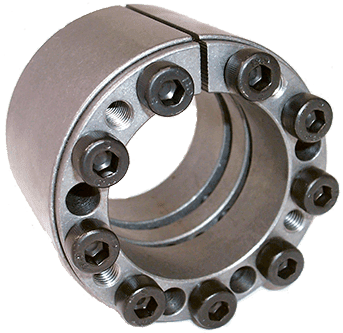
What are the design considerations when utilizing aluminum collars in machinery?
When designing machinery that incorporates aluminum collars, several considerations are vital to ensure optimal performance and safety. Here are the key design considerations:
- 1. Shaft Compatibility: Ensure that the aluminum collar’s inner diameter matches the shaft’s outer diameter. The fit should be snug without play to prevent slippage or misalignment.
- 2. Material Selection: Choose the right aluminum alloy for your collars based on the application. Different aluminum alloys offer varying properties, including strength, corrosion resistance, and weight. Select the alloy that best suits your machinery’s needs.
- 3. Collar Type: Determine the appropriate collar type based on your application. Set screw collars, clamping collars, or other variations provide different levels of clamping force and ease of installation. Select the type that aligns with your machinery’s requirements.
- 4. Environmental Factors: Consider the environment in which the machinery will operate. Aluminum collars are corrosion-resistant to some extent, but if exposed to harsh chemicals, moisture, or saltwater, you may need additional corrosion protection or alternative materials.
- 5. Weight Considerations: Take into account the machinery’s weight constraints. Aluminum collars are lightweight, making them suitable for applications where reducing weight is essential for performance and energy efficiency.
- 6. Precision and Tolerance: Maintain precision in collar dimensions and tolerances. Even small deviations in collar specifications can affect machinery performance. Quality control in manufacturing is crucial.
- Surface Finish: Ensure that the shaft and collar surfaces have the appropriate finish. A smooth surface finish reduces friction and wear. Consider surface treatments or coatings if needed.
- Clamping Force: Calculate and design for the required clamping force. This involves understanding the loads and stresses the collar will experience during operation. Overloading can lead to collar failure, so proper calculations are essential.
- Machining and Installation: Design the collar for ease of machining and installation. The collar should be straightforward to assemble, and it should not require specialized tools or complex procedures for installation.
- Alignment and Balance: Ensure that the collar is aligned with other components and balanced to prevent uneven stress or vibration issues. Misalignment can lead to wear and operational problems.
- Maintenance Accessibility: Consider how easily the collar can be accessed for maintenance. Machinery that requires frequent adjustments or inspections should have accessible collars for easy servicing.
By carefully addressing these design considerations, you can effectively integrate aluminum collars into your machinery, ensuring that they contribute to its performance, durability, and reliability.

Are there reviews available for popular brands of aluminum collars for user feedback?
Yes, user reviews and feedback for popular brands of aluminum collars can be valuable resources when making purchasing decisions. Here’s where you can find reviews and feedback for aluminum collar brands:
- 1. Online Retailers: Websites of online retailers like Amazon, eBay, and industrial supply stores often feature user reviews and ratings for a wide range of products, including aluminum collars. These reviews are provided by customers who have purchased and used the products.
- 2. Manufacturer Websites: Some manufacturers maintain websites or product pages where users can leave reviews and feedback on their products. This can be a reliable source of information as it allows users to share their experiences directly with the manufacturer.
- 3. Industrial Forums: Online forums and communities dedicated to mechanical components and industrial equipment often have sections where users discuss and review products. These discussions can provide insights into the experiences of professionals in the field.
- 4. Industry-specific Publications: Trade magazines, journals, and industry-specific publications may include product reviews and recommendations. These sources are often written by experts and can be a trusted reference for industrial products like aluminum collars.
- 5. Social Media and LinkedIn Groups: Professional social media platforms, such as LinkedIn, have groups and communities related to industrial and mechanical engineering. Users in these groups may share their experiences and opinions on various products, including aluminum collars.
- 6. Company Case Studies: Some companies provide case studies or success stories on their websites that highlight how their products, including collars, have been used in real-world applications. These can offer valuable insights into product performance.
When reading reviews and feedback, it’s important to consider multiple sources and weigh the overall sentiment. Look for common themes in the reviews and pay attention to factors that are most relevant to your specific application. Keep in mind that individual experiences may vary, so a well-rounded understanding is key when evaluating the quality and suitability of aluminum collar brands.


editor by Dream 2024-04-25
China factory API Aluminum Alloy Type Float Shoe and Float Collar eccentric collar shaft lock
Product Description
API Aluminum Alloy Type Float Shoe and Float Collar
1. Grade: J55, K55, N80, P110, L80, etc.
2. Connection (Thread) Type: LTC, STC, BTC
3. Introduction
Float equipment (float collar and float shoe) are used in well cementing.
Float collars are placed 1 to 3 joints above the guide shoe or float shoe. They provide a seat for the cement plugs, the bottom plug pumped ahead of the cement and the top plug behind the full volume of slurry.
Float shoes contain a backpressure valve that prevents fluids from entering the casing while the pipe is lowered into the hole and prevents cement from flowing back into the casing after placement, while enabling circulation down through the casing.
4. Characteristics
1) All inner parts are made of easily drillable aluminum alloy;
2) The device can be connected directly to same type casing;
3) Reliable back-pressure leak proof structure, enable grout or slurry flow with less resistance;
4) Valve seat and valve disk can effectively prevent grout from flowing back;
5. Parameters
| Name | Size (in) | Bore OD (in) | Bore ID (in) | Thread Type |
| Float Collar |
5 1/2″ | 6″ | 4 3/4″ | LTC,STC,BTC |
| 7″ | 7 5/8″ | 6 1/4″ | LTC,STC,BTC | |
| 9 5/8″ | 10 5/8″ | 8 5/8″ | LTC,STC,BTC | |
| 13 3/8″ | 14 3/8″ | 12 3/8″ | LTC,STC,BTC | |
| Float Shoe |
5 1/2″ | 6″ | 4 3/4″ | LTC,STC,BTC |
| 7″ | 7 5/8″ | 6 1/4″ | LTC,STC,BTC | |
| 9 5/8″ | 10 5/8″ | 8 5/8″ | LTC,STC,BTC | |
| 13 3/8″ | 14 3/8″ | 12 3/8″ | LTC,STC,BTC |
Our Team
HangZhou Maierda Petroleum Equipment Co., Ltd., located in Central China, is a professional supplier of oilfield equipment and accessories.
Our factories have more than 15 years experiences of manufacturing oilfield equipment and accessories.
Our sales team has more than 10 years importing & exporting experiences in oil & gas industry.
Our Products
We are specialized in oilfield equipment and accessories including casing centralizers, float equipment, stage collars, cementing plugs, cementing heads, cement baskets, casing & tubing pipes, sucker rods, drill pipes, drill collars, pumping units, etc.
We are committed to providing high-quality and cost-effective products and services to our customers.
Our Services
We guarantee and uphold the highest standards in customer service, client satisfaction, and quality product delivery in the oilfield industry.
Let’s join hands and work together to create a better future!
| Manufacturing Process: | Casting |
|---|---|
| Surface Treatment: | Spray-Paint |
| Operation Pressure: | Atmospheric Pressure |
| Material: | Cast Aluminum |
| Valve: | Spring Type |
| Standard: | API |
| Customization: |
Available
| Customized Request |
|---|
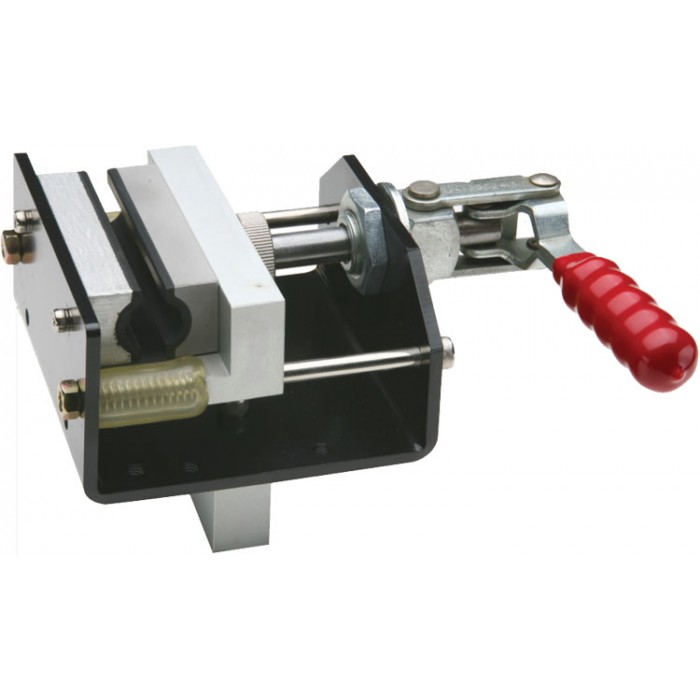
What are the best practices for maintaining aluminum collars in corrosive environments?
Maintaining aluminum collars in corrosive environments is crucial to ensure their longevity and optimal performance. Here are the best practices for proper maintenance:
- 1. Regular Inspection: Conduct routine inspections to identify any signs of corrosion or wear on the aluminum collars. Look for discoloration, pitting, or surface damage.
- 2. Material Selection: Ensure that the aluminum alloy used for the collars is corrosion-resistant. Select alloys with better resistance to corrosive agents, such as 6061 or 7075 aluminum, which offer good corrosion resistance properties.
- 3. Corrosion-Resistant Coatings: Consider using collars with specialized coatings or finishes that provide an additional layer of protection against corrosion. These coatings can include anodizing, which can improve resistance to environmental factors.
- 4. Proper Installation: Ensure that the collars are installed correctly and securely. Proper installation prevents gaps or openings that could allow corrosive agents to penetrate and damage the collar or the shaft.
- 5. Lubrication: Apply a compatible lubricant to the collar’s contact surface with the shaft. Lubrication reduces friction and can help protect against corrosion. Ensure that the lubricant is suitable for the specific environmental conditions.
- 6. Corrosion-Resistant Fasteners: If set screws or fasteners are used in collar installation, opt for corrosion-resistant materials such as stainless steel. This prevents galvanic corrosion between dissimilar metals.
- 7. Sealant and Gaskets: In highly corrosive environments, consider using sealants or gaskets to create a barrier between the collar and the corrosive elements. These components can help maintain the integrity of the collar’s seal.
- 8. Regular Cleaning: Clean the collars and surrounding components regularly to remove any accumulated contaminants. Use appropriate cleaning agents and methods that won’t harm the collar’s surface.
- 9. Environmental Monitoring: Continuously monitor the environmental conditions in which the collars operate. Make adjustments or modifications to the maintenance routine based on changes in the environment’s corrosive factors.
- 10. Replacement Schedule: Establish a replacement schedule for collars operating in particularly harsh or corrosive conditions. Regularly replace collars to prevent unexpected failures or deterioration in performance.
- 11. Consult with Experts: Seek advice from corrosion or materials experts when dealing with highly corrosive environments. They can provide guidance on the best practices and materials for your specific situation.
Proper maintenance of aluminum collars in corrosive environments extends their lifespan and ensures the continued reliability of your machinery and equipment. By following these best practices, you can mitigate the effects of corrosion and reduce the risk of premature collar failure.
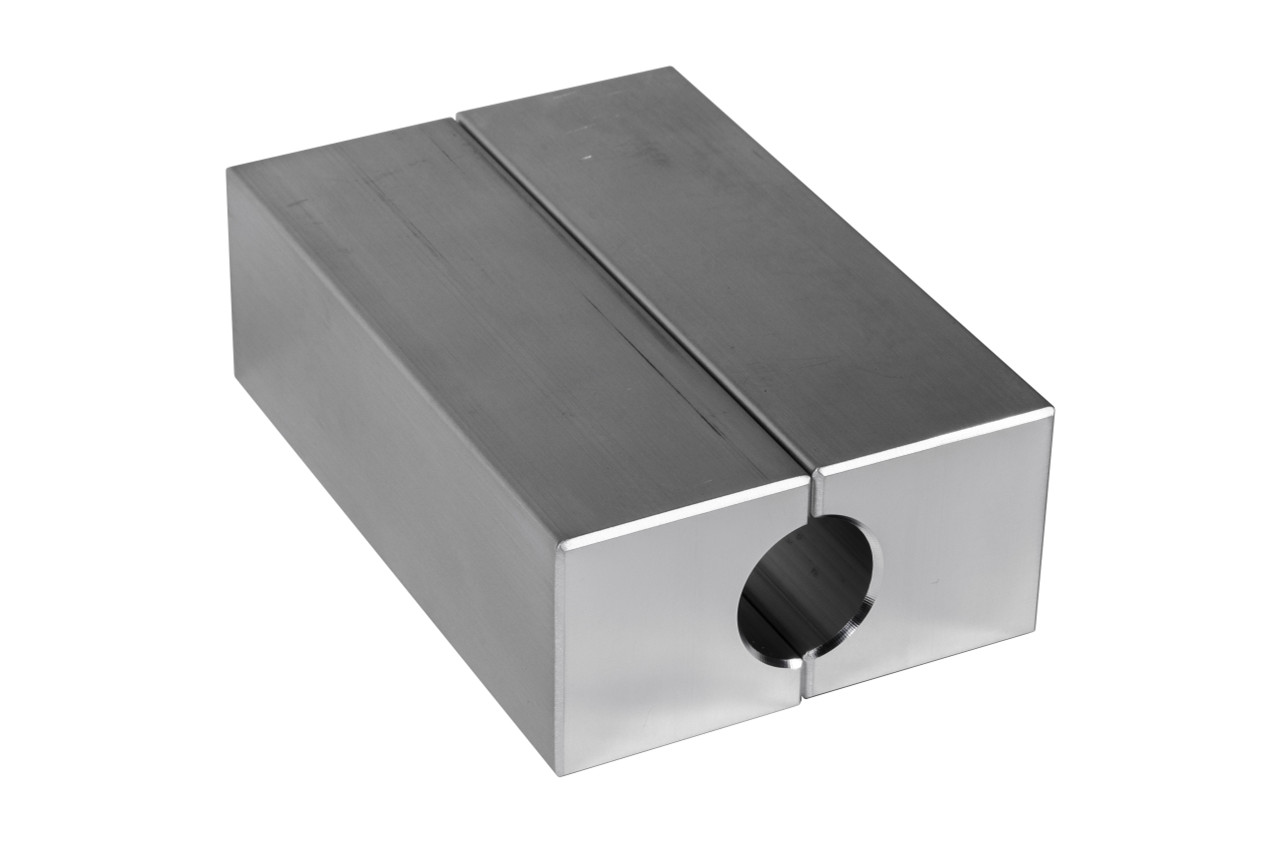
Can you provide recommendations for cost-effective aluminum collars catering to different budget constraints?
Selecting cost-effective aluminum collars is essential, and the choice should align with your specific budget constraints. Here are recommendations for cost-effective options catering to different budget levels:
- 1. Standard Aluminum Collars: Standard aluminum collars are the most budget-friendly option. They come in a range of sizes and styles and are suitable for various applications, especially when cost savings are a priority.
- 2. Single Split Collars: Single split collars are economical and easy to install. They provide a secure grip without adding extra cost. These collars are ideal for applications where budget constraints are a concern.
- 3. Bulk Purchase: Consider purchasing aluminum collars in bulk. Many suppliers offer discounts for larger quantities, which can significantly reduce the per-unit cost. Buying in bulk is a cost-effective strategy for long-term or high-quantity projects.
- 4. Shop Local: Check with local industrial suppliers and manufacturers. They may offer competitive pricing, and you can potentially save on shipping costs. Local suppliers may also have special deals or discounts for businesses in the area.
- 5. Online Price Comparison: Use online industrial supply platforms to compare prices from different suppliers. This allows you to find the most cost-effective option for your specific requirements while taking advantage of competitive pricing.
- 6. Consider Material Thickness: Evaluate the material thickness of the collar. Thicker collars provide added strength but can be more expensive. If your application doesn’t require the extra thickness, opt for thinner collars to save on material costs.
- 7. Evaluate Collar Type: Choose the collar type that suits your application without unnecessary features. For example, if you don’t need a high clamping force, opt for set screw collars over more complex clamping collars to save on costs.
- 8. Customization: If you have specific design requirements, consider custom aluminum collars. While there may be an initial design cost, custom collars can be tailored to your exact specifications, potentially reducing material waste and costs in the long run.
- 9. Maintenance and Durability: Consider the long-term cost-effectiveness. Investing in slightly higher-quality collars that require less maintenance and replacement over time can be more cost-effective than constantly replacing lower-quality collars.
Ultimately, the choice of cost-effective aluminum collars depends on your budget constraints and the specific needs of your application. By considering these recommendations and exploring different purchasing options, you can find the most budget-friendly solution that aligns with your project requirements.

Are there reviews available for popular brands of aluminum collars for user feedback?
Yes, user reviews and feedback for popular brands of aluminum collars can be valuable resources when making purchasing decisions. Here’s where you can find reviews and feedback for aluminum collar brands:
- 1. Online Retailers: Websites of online retailers like Amazon, eBay, and industrial supply stores often feature user reviews and ratings for a wide range of products, including aluminum collars. These reviews are provided by customers who have purchased and used the products.
- 2. Manufacturer Websites: Some manufacturers maintain websites or product pages where users can leave reviews and feedback on their products. This can be a reliable source of information as it allows users to share their experiences directly with the manufacturer.
- 3. Industrial Forums: Online forums and communities dedicated to mechanical components and industrial equipment often have sections where users discuss and review products. These discussions can provide insights into the experiences of professionals in the field.
- 4. Industry-specific Publications: Trade magazines, journals, and industry-specific publications may include product reviews and recommendations. These sources are often written by experts and can be a trusted reference for industrial products like aluminum collars.
- 5. Social Media and LinkedIn Groups: Professional social media platforms, such as LinkedIn, have groups and communities related to industrial and mechanical engineering. Users in these groups may share their experiences and opinions on various products, including aluminum collars.
- 6. Company Case Studies: Some companies provide case studies or success stories on their websites that highlight how their products, including collars, have been used in real-world applications. These can offer valuable insights into product performance.
When reading reviews and feedback, it’s important to consider multiple sources and weigh the overall sentiment. Look for common themes in the reviews and pay attention to factors that are most relevant to your specific application. Keep in mind that individual experiences may vary, so a well-rounded understanding is key when evaluating the quality and suitability of aluminum collar brands.


editor by CX 2023-11-20
China Standard Double Split Stainless Steel Clamp eccentric shaft collar
Product Description
Products description
Shaft collar is a simple but important mechanical component. It is widely used in Power Transmission applications, such as motors and gearboxes. The Shaft collars are used as mechanical stops, locating components, and bearing faces. The simple design lends itself to easy installation
–Set screw type/ Set Screw Shaft Collar
–Single Split Collar / One-piece Shaft Collar
–Double Split Collar / Two-piece Shaft Collar
–One-Piece Threaded Collar
–Double wide shaft collar
Set screw type is the most effective when used on a shaft made of a material which is softer than the set screw.
Threaded shaft collars offer the same quality and benefits of smooth bore Collars, meanwhile providing additional features. Threaded collars provide axial holding power which is superior to smooth bore collars, while offering easier installation and adjustment than CZPT ring locking devices.
One-piece shaft collars wrap around the shaft for even distribution of clamping forces. This results in a tight fit and greater holding power, without the shaft damage caused by set screws. Clamp collars are easy to remove, indefinitely adjustable, and work well on virtually any shaft.
Two-piece shaft collars offer the same benefits as one-piece shaft collars with additional versatility and convenience. The split design is easily installed and disassembled, reducing labor and downtime when adjustment, removal, or replacement is necessary. These clamping forces provide the collar with a holding power superior to one-piece and set screw shaft collars.
Unik Shaft Collar Features:
Superior fit, finish and holding power.
Tightly controlled face to bore perpendicularity.
Bore size stamped on every shaft collar.
Black oxide finish produces holding power and resisting corrosion.
DIN 12.9 for metric screws for maximum torque ability.
black oxide and zinc-plated steel, Stainless Steel, Aluminum
FAQ
Q1. What is your terms of packing?
A: Generally, we pack our goods in single color box. If you have special request about packing, pls negotiate with us in advance, we can pack the goods as your request.
Q2. What is your terms of payment?
A: T/T 30% as deposit, and 70% before delivery. We’ll show you the photos of the products and packages
before you pay the balance. Other payments terms, pls negotiate with us in advance, we can discuss.
Q3. What is your terms of delivery?
A: EXW, FOB, CFR, CIF.
Q4. How about your delivery time?
A: Generally, it will take 25 to 30 days after receiving your advance payment. The specific delivery time depends
on the items and the quantity of your order.
Q5. Can you produce according to the samples?
A: Yes, we can produce by your samples or technical drawings. We can build the molds and fixtures.
Q6. What is your sample policy?
A: We can supply the sample if we have ready parts in stock, but the customers have to pay the sample cost and
the courier cost.We welcome sample order.
Q7. Do you test all your goods before delivery?
A: Yes, we have 100% test before delivery
Q8: How do you make our business long-term and good relationship?
1. We keep good quality and competitive price to ensure our customers benefit ;
2. We respect every customer as our friend and we sincerely do business and make friends with them,
no matter where they come from.
| Material: | Carbon Steel |
|---|---|
| Load: | Drive Shaft |
| Stiffness & Flexibility: | Stiffness / Rigid Axle |
| Journal Diameter Dimensional Accuracy: | IT6-IT9 |
| Axis Shape: | Straight Shaft |
| Shaft Shape: | Hollow Axis |
| Samples: |
US$ 0.8/Piece
1 Piece(Min.Order) | |
|---|
| Customization: |
Available
| Customized Request |
|---|
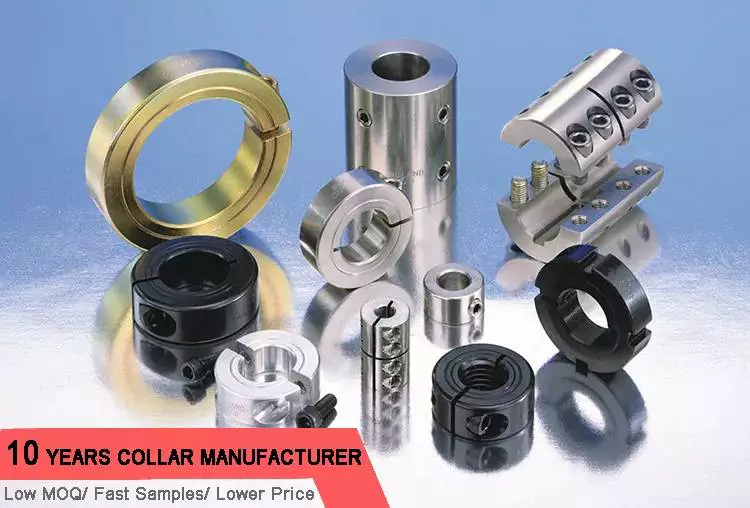
Types of Shaft Collars
A shaft collar is a simple machine component that plays a critical role in power transmission. It is typically found in gearboxes and motors, and serves as a bearing face, mechanical stop, and locating component. Its simple design makes it easy to install and use. Its various functions make it a useful machine part for many applications.
Set screw shaft collars
Set screw shaft collars are used in many different applications and can be manufactured in a variety of materials. Typical materials include carbon steel, stainless steel, platinum, silver, nylon, polysulphone, PTFE, and PVC. Collars are easy to install and adjust. A variety of secondary services are available, including internal forming, chroming, and passivating.
Set screw shaft collars come in different styles, including standard collars, quick-release collars, split collars, and threaded collars. They can be purchased in standard and metric sizes, and are available in a variety of finishes. Standard collars are available in steel and stainless steel and have a zinc plated or black oxide finish.
Set screw shaft collars are an excellent choice for holding power transmission components in place and limiting shaft movement. They are held in place by a set screw that digs into the shaft material, providing holding power. They are available in both 303 and 316 Stainless Steel, making them a reliable and efficient choice for a variety of applications.
Clamping-style shaft collars
Clamp-style shaft collars are a versatile alternative to set-screw collars. They eliminate the problems associated with the set-screw collar, such as the possibility of shaft damage. They also lock in place by compressing against the shaft. This method distributes the force on the collar and shaft evenly, creating a stronger holding power.
Shaft collars are manufactured by many companies. You can buy them in-store or online, but it is important to buy from a reputable manufacturer. Many counterfeit collars endanger the life of your machine. Choosing a quality collar will help you avoid costly and time-consuming machine breakdowns.
Clamping-style shaft collars come in a variety of sizes and types. Some of them have a hex or D-bore. Some have circular grooves to assist with installation. They can be found in bore sizes from 1/4″ to one inch. They are often used for mounting gears, sprockets, and bearings.
Two-piece clamp collars are an excellent choice for high-load applications. They have improved clamping force and impressive holding power, and can be easily installed without major disassembly. Two-piece clamp collars can also be designed with a keyway to secure a keyed shaft. There are also special double-wide clamp collars for high axial load applications.
Another type of shaft collar is the quick clamping collar. It is an excellent choice for applications where you want to make frequent setup and adjustments. It allows for easy adjustments with minimal tools. Quick clamping collars feature a cam lever and a clamping lever. They are convenient and highly flexible, making them ideal for use in many industries.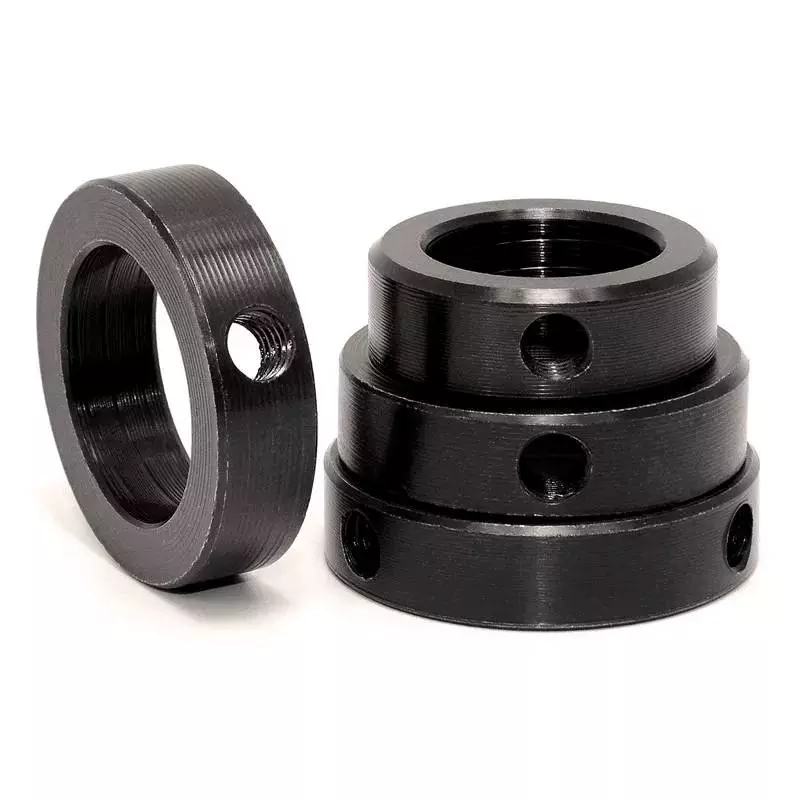
Single split shaft collars
A single split shaft collar is designed to fit one shaft and eliminate two pieces. This makes installation and disassembly easy, reducing labor and downtime. It also uses a full seating torque of the set screws to distribute forces evenly around the shaft circumference, providing stronger holding power. It can be used on a wide range of rotating equipment.
Single split shaft collars are available from CZPT Products. They are a common, high-quality way to secure a shaft. They wrap around the shaft for a secure and tight fit. They are also a versatile option that can be easily removed. These collars can be used on both hard and soft standard round shafts. They provide superior grip compared to solid collars, provide tremendous axial force, and minimize shaft distortion.
Single split shaft collars are one of the many types of bearing shaft locking collars. They are made of EN8 steel, and come with a locking setscrew. This makes installing the collar quick and easy. The collar is available in many sizes, including small, medium, and large. If you do not find the right fit, you can also have one custom-made.
These collars are commonly used for mounting fixtures, sensors, and other assemblies. They are available in two-piece and one-piece styles, and have higher holding power than standard shaft collars. They are available in a wide range of materials, including 1215 lead-free steel, 303 stainless steel, and lightweight 2024 aluminum.
Aluminum shaft collars
The CZPT company produces Aluminum shaft collars for a variety of applications. These shaft collars feature a proprietary manufacturing process to ensure accurate face-to-bore perpendicularity. This helps to improve clamping forces and installation fit. Each collar features the CZPT name stamped on it, and the collar is finished with a black oxide process to achieve a fine glossy finish. The shaft collars are available in a variety of bore sizes and styles, and can be ordered in single or two-piece styles. Additionally, they are manufactured with a high-grade forged screw, which ensures the highest quality.
Aluminum shaft collars can be customized to fit your needs. Several accessories can be added to the shaft collar, such as steel mending plates. Those who need extra load capacity can select a keyed shaft collar. They are also available in lightweight styles. These shaft collars are easy to install and disassemble, and are made from two-piece aluminum for ease of installation.
Choosing the right shaft collar material is critical to the success of your application. You should consider steel, stainless steel, or aluminum for the best corrosion resistance. Steel is stronger and offers better holding power, while aluminum offers a lower weight and a favorable strength-to-weight ratio. When selecting shaft collars, it is important to take into consideration the corrosion resistance of each material. For example, carbon steel shaft collars will not be as corrosion resistant as aluminum shaft collars, but they are lighter and have a good hold power.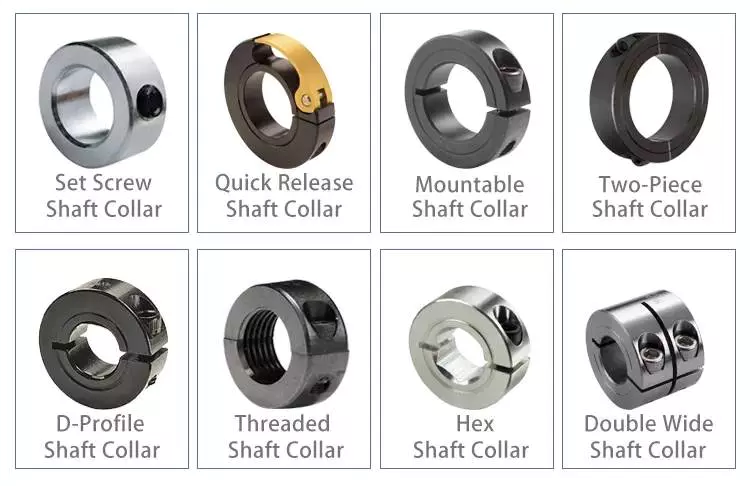
Carbon steel shaft collars
Carbon steel shaft collars are a versatile solution to holding bearings in place. They are available in a range of diameters and styles to meet your application needs. They can be used for many different applications, from aerospace and military applications to marine and automotive applications. These collars are available in a variety of materials, including carbon steel, aluminum, and stainless steel.
Carbon steel shaft collars are a cost-effective alternative to stainless steel shaft collars. CZPT manufactures lead-free carbon steel shaft collars, and they are also available with RoHS-compliant yellow zinc plating. Zinc plating is less expensive than stainless steel and is an excellent anti-corrosive option. CZPT yellow zinc collars are plated by a trivalent process rather than a non-compliant hexavalent process.
Shaft collars are available in both metric and inch bore sizes. They can be used for a variety of applications and are typically available in sizes ranging from 1/4″ to three inches. They are also available with metric screws in a range of sizes, which are useful for retrofitting equipment.
Shaft collars are available in a variety of materials, including carbon steel, 303 stainless steel, and aluminum. Some options feature threads and can be welded or bolted to shafts. For more advanced applications, aluminum threaded shaft collars can be used. They are often used for mounting sensors, fixtures, and other assemblies. They come in several styles, such as double-wide, heavy-duty, and threaded.
Hinge shaft collars
Hinge shaft collars are fastening devices that secure shafts or axles. They come in a wide range of sizes, shapes, and materials. These collars can be used in a wide range of applications, including non-rotary applications. They can be manufactured in stainless steel, 1018 steel, aluminum, and brass.
Shaft collars are simple to use but can perform a variety of functions. Their primary functions include holding components in place, locating components on a shaft, and establishing attachment between the shaft and another component. To choose the right collars for a specific application, designers should consider the design, style, materials, bore size, and geometry of the shaft. They should also consider any limitations or requirements associated with the application.
Hinge shaft collars are available in round and square bores. They are most commonly used in agricultural applications. Their size makes them easy to install, and their design makes them suitable for both large and small shafts. They are also used in situations where shafts are not easily accessible. Some types of shaft collars feature flat surfaces, which are great for mounting applications and splitting hubs.
Heavy duty shaft collars are also available. These collars have larger outer diameters, wider bores, and larger screw diameters. They are manufactured from lead-free steel with a proprietary black oxide finish.

editor by CX 2023-05-11
China Hot selling Standard Single Split Shaft Collar Stainless Steel Black Coating Shaft Collar eccentric collar shaft lock
Product Description
Product Description
ONE-PIECE
One-piece shaft collars wrap around the shaft for even distribution of clamping forces. This results in a tight fit and greater holding power, without the shaft damage caused by set screws. Clamp collars are easy to remove, indefinitely adjustable, and work well on virtually any shaft. we uses carefully selected materials and proprietary processes on its one-piece collars to ensure the clamping gap remains open for simpler and more precise adjustment, installation and fit. we manufactures one-piece clamp shaft collars in 12L15 lead-free steel with a zinc or proprietary black oxide finish, 303 and 316 stainless steel, high-strength 2571 aluminum, and engineered plastic. Bore sizes range from 1/8″ to 6″ and 3mm to 150mm.ONE-PIE
1.materials:stainless steel,alloy steel ,aluminum ,brass etc.
2.Finish: Zinc plating, Nickel plating,nature
3.competitive price ,prompt delivery
4.OEM service as your drawings
Technics
1.Milling 2.grinding 3.Turning 4.wire-cutting 5.CNC bending 6.CNC machining 7.Stamping 8.forging 9.boring 10.broaching and so on .
Accuracy
1.Milling:0.01mm 2.Turning:0.01mm 3.Grinding:0.002mm 4.Wire-cutting :0.005mm 5.CNC Machining : 0.005mm
Production ability
|
EQUIPMENT LIST |
||||
|
NAME
|
SPECIFICATION |
BRAND |
ORIGINAL PLACE |
QUANTITY |
|
CNC Machines |
Graph 600 |
KNUTH |
CHINA |
20 |
|
1370 |
KAFO |
TAPAN |
20 |
|
|
EDM Machines |
ZNC450 |
BHangZhouNA |
ZheJiang |
20 |
|
ZNC430 |
BHangZhouNA |
ZheJiang |
30 |
|
|
Grinding Machines |
ACC-350ST |
BESFORD |
CHINA |
50 |
|
Auto Lathe Machining |
L150G-II |
OKUMA |
CHINA |
80 |
|
Wire Cutting Machines |
DK7732 |
NEW FAST |
CHNA |
30 |
|
Milling Machine |
SHCM-97A |
GENTIGER |
ZheJiang |
20 |
|
CMM Machine |
CRT-PA574 |
MITUTYO |
JAPAN |
10 |
|
Hardness Tester |
TILO-T60 |
MITUTYO |
JAPAN |
5 |
Productions showing:
| More Detail Informations | |
| Sample Available |
1.Sample is free of charge if we have the existing,you only need to pay the freight cost.Sample will be provided within 3 to 10 working days. 2.If the products is non-standard and no existing tooling inventory,The full mould cost needed prepaid, sample will be provided within 7 to 15 working days, you’ll pay the freight cost. |
| MOQ | 1pcs |
| Pricing Term | EXW HangZhou ,FOB,CIF,CNF,DDU,etc. |
| Payment Term | TT(30% in advance as deposit,balance before delivery),L/C,Western Union,PayPal etc. |
| Port of loading | HangZhou port or ZheJiang port. |
| Lead Time | 15-35 working days after order and deposit received. |
| Warranty |
1.We shoulder the ability based on product categories to determine the warranty, and guarantee more than 18 months. 2.We don’t assume responsibility for the damage which is caused by indirect, accidental events at anytime anywhere. |
Founded in 2005,HangZhou HC Co.,Ltd is an IATF16949:2016 manufacturer.We have more than 20 years of production experience in the production of cnc machining/Milling parts,cold forming,graphite products, We not only have new imported prodution equipment and spacious storage space,but also have a group of experienced workers and professional engineering R & D team.Therefore, our company has enough strength to meet the needs of customers.
Equipments & Working plant:
Worry about our quality problem?
We are an IATF16949:2016 Certifed supplier, strictly execute inspection on ISO quality control system. All our products will pass 10-step inspections: it starts from incoming material inspection to IPQC, then FQC and final inspection with reports before shipment.
Packing:Generally carton or wooden case or plastic foam with standard export wooden pallet , or as per consumer’s requirements.
Certifications:
Your Satisfaction, Our Motivation!
FAQ
Q1. Are you factory or trading company?
A: We are a customized factory with independent oversea trading office .
Q2.Can you provide sample for us?
A: Yes, free sample is available
Q3. What raw material do you use?
A: Stainless Steel, Carbon Steel, Mild Steel, Galvanized Steel, Aluminum alloy, brass, copper, Aluminum etc.
Q4. What finishes can you provide?
A: powder coating, polishing, zinc/nickel /chrome plating, painting, anodized, hot dip galvanized, sandblasted etc.
Q5. How do you ensure quality control?
A: We inspect every process based on your drawings or samples and also check the products before packing
Q6. Is small quantity available?
A: Yes, Small quantity for trial order is available.
Q7. How do you ship the goods?
A: We have our cooperation forwarder, they can deliver the goods to you in very short time with competitive price, and you can ship by your own agent as your convenience.
Q8. How about your delivery time ?
A: 3-10 days for samples and 15-45 days for mass production .
Q: How To Place A Order?
* You send us drawing or sample
* We make the sample and send it to you
* You think the sample is good then place an order and pay us 30% deposit
* We start to make the product
* When the goods is done, we take photoes for your check and you then pay the balance
* We deliver the products to courier company
| Application: | Auto and Motorcycle Accessory, Machinery Accessory |
|---|---|
| Standard: | GB, EN, JIS Code, TEMA, ASME |
| Surface Treatment: | Anodizing |
| Production Type: | Mass Production |
| Machining Method: | CNC Turning |
| Material: | Nylon, Steel, Plastic, Alloy, Aluminum |
| Samples: |
US$ 10/Piece
1 Piece(Min.Order) | |
|---|
| Customization: |
Available
| Customized Request |
|---|

Types of Shaft Collars
A shaft collar is a simple machine component that is an integral part of many power transmission applications. It is most commonly found in motors and gearboxes and serves as a mechanical stop, locating component, and bearing face. Its easy installation and quick assembly make it an ideal component for a variety of applications.
Clamp-style shaft collars
Clamp-style shaft collars are fasteners that fit over shafts. They can be made of aluminum, steel, or titanium. Stainless steel collars are available in corrosion-resistant finishes to prevent galling. Engineered plastics are also available. Black oxide finishes improve corrosion resistance and provide a smooth surface for screw installation.
The holding power of Clamp-style shaft collars depends on the shaft’s bore size and concentricity, which are important factors in many applications. The fastening hardware is also important, as it can affect torque transmission. For example, forged screws are superior to broached screws in a number of ways, including reduced risk of reaming out. In addition, the material of the collar must be strong enough to withstand the torque required by the screw.
Shaft collars are complicated components. Their performance can determine the efficiency of an application. The design process is complex, and many factors are considered. Considerations include shaft geometry, bore size, and style. Shaft collar manufacturers will provide performance information on their website. If you are not satisfied with the information provided, you can contact the manufacturer.
Clamp-style shaft collars are made from high-quality materials. The metal used to produce them is lead-free and stainless, which resist corrosion. Moreover, these shaft collars have a high holding power, so they won’t mar your shaft and ensure proper alignment. These collars can be found in a variety of bore sizes, from 1/8″ to six inches.
Clamp-style shaft collars are available in lead-free steel, 303 and 316 stainless steel, and aluminum. They are available in a one-piece clamp or a two-piece clamp style. They are made of high-grade steel and are machined to a burr-free surface.
Clamp-style shaft collars have two-piece clamps that can be easily disassembled and installed in their proper position. Two-piece clamps are stronger than one-piece collars because all of the clamping force goes directly into the clamping shaft. Two-screw clamps have two and four-screws, and can also be wrench-tightened.
Set screw collars were one of the first shaft collars to be mass-produced. They were often used on line shafting in early manufacturing mills. While they can work well for simple shaft positioning, they’re not the most reliable option for complicated applications. Furthermore, set screws can cause damage to the shaft, making it difficult to reposition the collar or adjust its angle. For this reason, small flats are usually added to the shaft at set screw locations.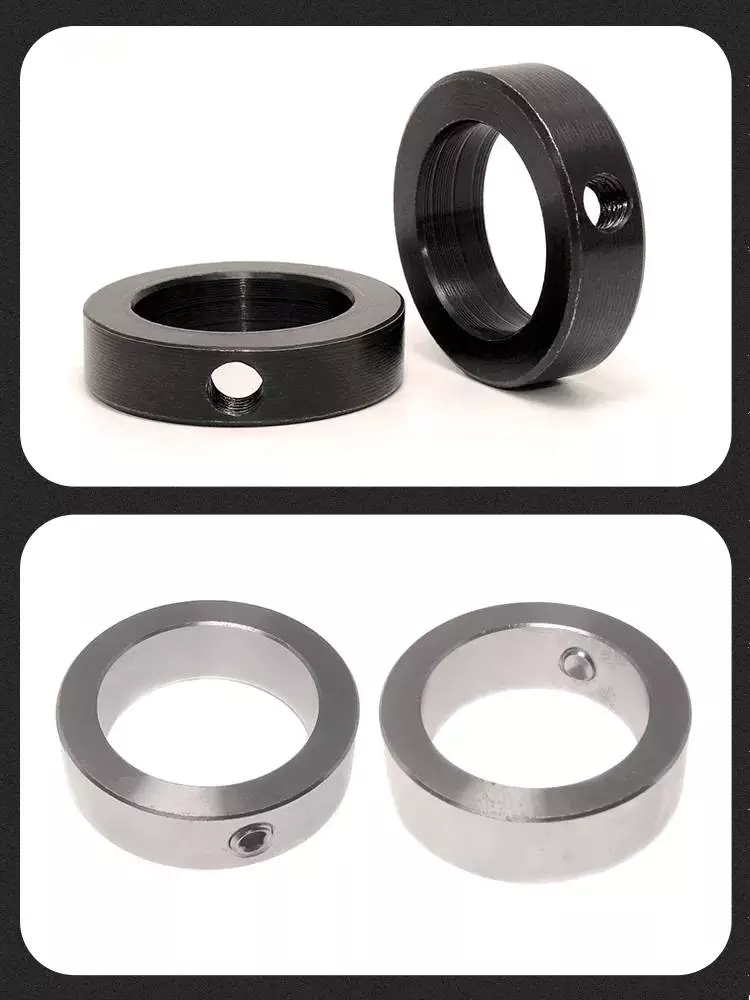
Set-screw shaft collars
Set-screw shaft collars are used to secure a shaft to a screw. They are available in several sizes and materials. Typical types include the solid, quick-release, split, and threaded styles. They come in an assortment of sizes and materials, including aluminum, zinc plated steel, and black oxide steel. Most are available in stock and are available in various sizes.
These collars come in many sizes and are ideal for use with standard round shafts. They are easy to install and disassemble and feature a high clamping power. They are also available in custom designs and materials. Set-screw shaft collars are available for use in various industries.
The company manufactures a variety of collars, including steel, zinc plated steel, and stainless steel. They also offer custom and adjustable collars. These collars are used in a variety of industries, including the food, chemical, pulp and paper, and wood industries. They are available with a variety of screw threads.
The screw and shaft material relationship must be compatible to ensure a secure fit. In addition, the shaft material should be softer than the screw material. For this reason, set-screw shaft collars are most effective when the shaft is made from softer material. Some setscrew shaft collars feature forged socket set screws to increase their holding power and torque capacity. Additionally, forged stainless steel set screws also increase their performance and hardness.
Shaft collars can be used on machines and transmission applications. They can be adjusted with a set screw or grub screw. In addition to setting the collar into place, a screw driver can also be used to adjust the grip on the collar. This type of shaft collar is often used in manufacturing applications.
Clamp-type collars are another type of shaft collars. These types allow the shaft to rotate and are used for mounting sensors and fixtures. These collars can be found in one-piece or two-piece styles. They can also be used in harsh environments.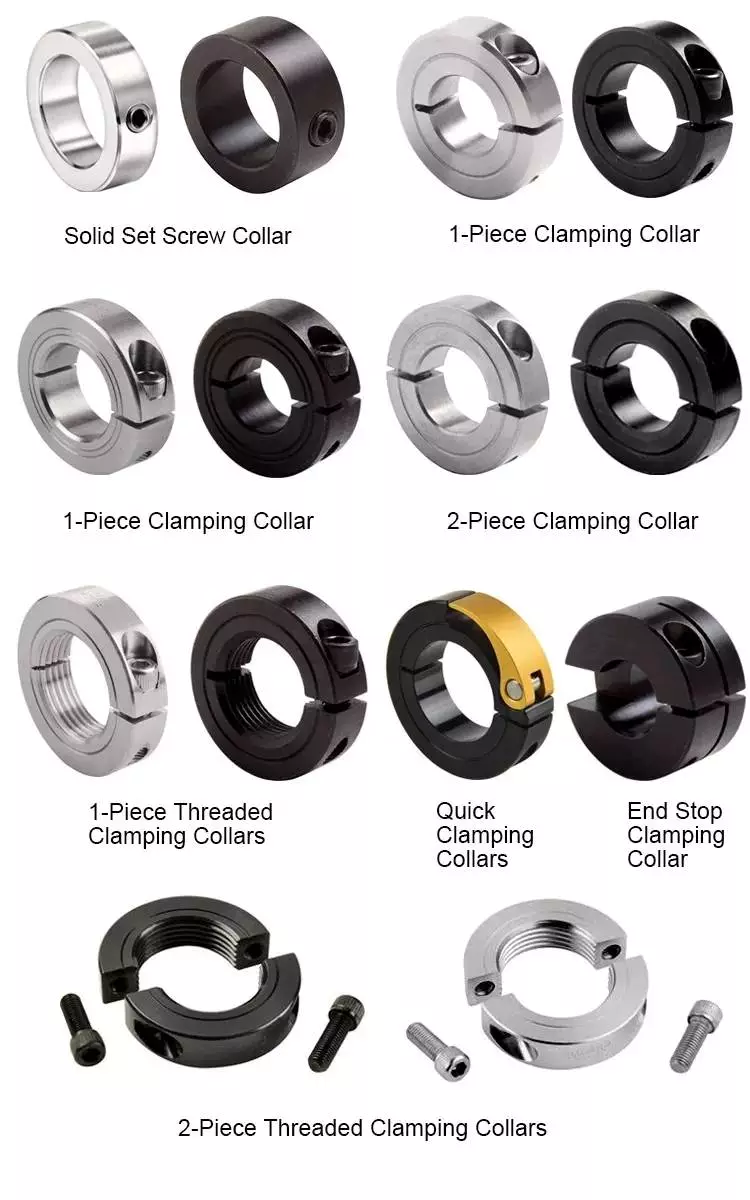
Single split shaft collars
Single split shaft collars are used in many applications to protect the shaft from wear and tear. They are easy to install and disassemble, reducing downtime and labor costs. These collars utilize full seating torque of the set screws to apply equal force distribution around the shaft’s circumference, providing stronger holding power.
These shaft collars are available in a variety of materials. They are typically made from different types of steel, including stainless, alloyed steel, nylon, and aluminum. Some are even available in custom sizes. In addition to standard sizes, single split shaft collars also come in a variety of finishes, including black oxide and chrome.
Single split shaft collars come in metric and imperial sizes. They can be made of various materials, including zinc and lead-free steel. These collars are available with a black oxide finish for extra corrosion resistance. They are also available in 303 and 316 stainless steel. They can also be made from engineered plastics.
Single split shaft collars are the most popular style of shaft collars. They are easy to install and disassemble. They provide a tight fit and superior holding power over solid shaft collars. They are also easier to replace and can be used on a variety of shafts. In addition, single split shaft collars are easy to remove and adjust.
Single split shaft collars are available in a variety of bore sizes. They can fit shaft diameters from 1/8″ to four fifteen/16″. Ideally, the material used should be softer than the set screw. You can also choose between non-plated and chrome-plated collars. These collars are available in metric or imperial measurements.
Single split shaft collars are one-piece or two-piece designs. Single-piece shaft collars feature one screw and two-piece collars have two. They are easier to install than single-piece shaft collars and are suitable for lighter duty applications. Single split shaft collars are available in a variety of threaded bore sizes.
Single split shaft collars have a wide range of uses in industrial settings. They can secure bearings on shafts or locate components in motor assemblies. They can also function as mechanical stops. RS PRO offers a wide selection of shaft collars that meet and exceed industry standards.

editor by CX 2023-04-21
eccentric shaft collar
Solution Description
Product Description
Dozer areas D60/D65/D80/D85/D155/D275
SD13/SD16/SD22/SD23/SD32/D60/D65/D85/D155/D275
shantui dozer areas
Brand : shantui/CAT
Product: SD13/SD16/SD22/SD23/SD32
D60/D65/D85/D155/D275
warranty:6 months
FAQ
Q1:You are a trader or manufacturer .
We are a trader .
Q2: How about the payment terms ?
We typically accept T/T . Other conditions also could be negotiated .
Q3: Warranty
3-6 months warranty. If any elements break during the warranty, Just offer us the evidence . We’ll send out you a new 1 !
Q5:If components be misplaced in the course of supply , how resolve ?
We’ll resend the elements free of charge .
|
US $2-5 / Piece | |
1 Piece (Min. Order) |
###
| Type: | Crawler |
|---|---|
| Application: | Bulldozer & Excavator |
| Certification: | ISO9001: 2000 |
| Condition: | New |
| Model: | D60/D65/D80/D85/D155/D275 |
| Brand: | Cat/Shantui |
###
| Samples: |
US$ 300/Piece
1 Piece(Min.Order) |
|---|
|
US $2-5 / Piece | |
1 Piece (Min. Order) |
###
| Type: | Crawler |
|---|---|
| Application: | Bulldozer & Excavator |
| Certification: | ISO9001: 2000 |
| Condition: | New |
| Model: | D60/D65/D80/D85/D155/D275 |
| Brand: | Cat/Shantui |
###
| Samples: |
US$ 300/Piece
1 Piece(Min.Order) |
|---|
What Is a Shaft Collar?
A shaft collar is a simple machine component, but its function is important in many power transmission applications. Most commonly, shaft collars are used in motors and gearboxes. They can act as locating components, bearing faces, and mechanical stops. Their compact design makes them easy to install. In addition, they provide a clean, simple look for your gearbox or motor.
Sizes
There are a variety of sizes of shaft collars. Each type has different parameters and requirements. These specifications can be found on the manufacturer’s website. These dimensions are important for the selection process. In order to determine which size is best for your needs, first identify the system parameters and limitations that you’ll be using.
Shaft collars are available in a variety of sizes and materials. These pieces can range in thickness from just a few millimeters to several inches. A solid steel shaft collar is usually available from 1/8″ to six inches. The material used for shaft collars is either 304 stainless steel or lead-free steel.
The oldest style of shaft collar is the set collar, which uses a hardened set screw to penetrate the shaft surface. It is ideal for holding bearings, spacers, and sprocket hubs. These collars are typically installed using hex keys, which are six-sided L-shaped tools, also known as Allen Wrenches. These collars are useful for many different machine applications, and are often used in conjunction with springs and dampers to hold components in place. They are also useful as mechanical stops, stroke limiters, and bearing holders.
Shaft collars come in one-piece and two-piece designs. A one-piece collar provides uniform holding force on the shaft, whereas a two-piece shaft collar is stronger and can be assembled anywhere on the shaft. Shaft collars are generally available in English and metric units, and the manufacturer can alter the dimensions of any standard collar to meet your needs. For more unique situations, you can also choose a fully customized shaft collar that is specific to your application.
Functions
A shaft collar is a metal or plastic device used to locate and position components on a shaft. It also limits the movement of the shaft. These devices can be found on a wide variety of applications, including motor assembly components. There are many types of shaft collars. To help you find the right shaft collar for your application, you can use Thomas Supplier Discovery Platform. The platform has over 70,000 product categories to help you find the right solution.
Clamp-type collars are reliable under constant loads, but may require additional support under shock loads. A shock load is a force generated by a relatively small mass that is rapidly increased by impact. Clamp-style collars are designed to counteract this force, and an undercut on the shaft may help them stay firmly in place. Clamp-style collars are also available in two-piece designs, which offer a high holding force and ease of assembly.
A shaft collar is an important machine component. It holds and positions sprockets on a shaft. It also acts as a mechanical stop, and helps prevent a shaft from slipping. They can also be used to limit the movement of cylinders and actuators. These simple components are found in virtually every type of machinery.
The torque-generating force in a set-screw shaft collar is absorbed by friction between the threads and the clamp body. The friction between these parts helps compensate for the lost torsioning effort, which can lead to the collar failing to hold. Alternatively, a torque wrench can help control the final torque of the shaft collar.
Types
There are many different types of shaft collars available for different applications. It is important to understand the characteristics of each to find the right one for your application. The most common shaft collars are made from steel or aluminum, but some are also made of plastic. These are relatively inexpensive and lightweight, but their holding power is limited. Titanium shaft collars are much lighter than aluminum and are resistant to extreme temperatures, but they are only used in a few specific applications.
Another type is a clamp collar, which is mounted using a compression method. Compared to the set screw type, clamp collars are much stronger and have a higher holding power. Clamp collars come in either a one-piece or two-piece design. One-piece collars are used in applications where the shaft is split and requires a positive stop.
The strength of a shaft collar depends on the type of screw used to attach it to the shaft. The screw’s strength and diameter will affect the holding power of the shaft collar. In most cases, a manufacturer will offer the proper screw with the collar. In some cases, however, a non-standard screw may be more appropriate.
The set screw collar is one of the oldest types. Its disadvantage is that it can be difficult to move and may damage the shaft. Also, it is not as secure as a clamp-based collar. In addition, two-piece hinged shaft collars are the most convenient. One-piece collars are difficult to move, while two-piece collars can be moved easily along the shaft without separating components.
Dimensions
Shaft collars are a complex component and their dimensions are crucial to the performance of the application. Designing a shaft collar requires consideration of a variety of factors, such as the type of material, bore size and geometry of the shaft. The manufacturer of a shaft collar will usually publish performance data on its website, or users can contact them for assistance.
The material used in shaft collars has a significant impact on the collar’s strength and its holding capacity. Shaft collars should be made from a high-quality, corrosion-resistant material. The strength of the screw also plays an important role in the collar’s holding capacity. Generally, a collar’s manufacturer will provide the appropriate type of screw for the application. However, in some cases, a non-standard screw may be necessary.
Shaft collars are available in a variety of styles. One-piece collars are often used in applications where there is minimal or no disassembly or adjustment required. Alternatively, two-piece collars may be used when frequent disassembly is needed. Regardless of the style, the size of shaft collars should be consistent with the requirements of the assembly.
Shaft collars are made from steel or aluminum. They offer good holding power and are lightweight. Steel shaft collars are durable and have good corrosion resistance. However, the grade of steel can affect their performance. Stainless steel collars are easier to machine and have improved corrosion resistance. However, they may reduce the holding power.
Stainless steel
A stainless steel shaft collar is a simple mechanical component used to secure a shaft. It is used for many different applications, most commonly in motors and gearboxes. They also function as locating components, mechanical stops, and bearing faces. These collars are available in different sizes and can be used for a variety of different purposes.
Shaft collars come in various materials, including stainless steel, aluminum, and polyamide. They are available with a variety of different finishes, including electroless nickel plating. Stainless steel shaft collars are available in various diameters, including 5/16 in. through 5/8 in. They are also available in single and double split styles.
CZPT offers a full line of stainless steel shaft collars in both 303 and 316 stainless steel. These collars are resistant to corrosion caused by water and a wide variety of commercial-grade cleaning agents. They are also supplied with fastening hardware of similar material. For added durability, CZPT shaft collars are also available in engineered plastic.
Stainless steel shaft collars can be easily adjusted for the proper torque. They come in various sizes and are easy to install and remove. They can also be re-bored if necessary. One type of shaft collar is quick-clamp, which is equipped with a clamping lever and a handle. It’s ideal for frequent setup and adjustment.
Quick-clamp shaft collars
Quick-clamp shaft collars are a simple and convenient way to secure a shaft. They have a flush handle that sits flush with the outside diameter of the shaft and can be easily adjusted by hand. They are made from lightweight aluminum and stainless steel hardware that does not mar the shaft.
These shaft collars replace standard hardware and are easy to install and remove. Quick-clamp shaft collars are available in one, two, and three-piece clamping styles. Some quick-clamp shaft collars have an integrated hinge and countersunk mounting holes for easy mounting. They can also have a knurled nut for easier locating.
Quick-clamp shaft collars are a convenient option for many types of packaging machinery. They can be installed and adjusted with no tools, making them an efficient choice for frequent changeovers and setups. CZPT offers two types of quick-clamp shaft collars. The first type has a cam lever that sits flush with the outside diameter and is finger operated. The second type has an adjustable tension-adjustment screw for easy adjustment. Both designs are ideal for low-rpm applications where frequent changeovers are needed.
Quick-clamp shaft collars are made of black anodized aluminum and steel fasteners. These shaft collars are available in sizes ranging from 0-300mm and in various designs. A quick-clamp shaft collar has a high load-bearing capacity, and a high torque capacity. Axial load capacities and torque specifications are non-binding guidance values and do not represent a warranty or guarantee of their characteristics.

editor by czh 2023-03-23
China 1″ Carbon Steel European Type Air Hose Coupling Flexible Couplings eccentric collar shaft lock
Solution Description
Carbon Metal European Type Air Hose Coupling (Hose Finishes with Collar)
Description:
Variety: E. U TYPE HOSE Ends WITH COLLAR
Content: Carbon Metal—ZN PLATED
Size: 1/4″ 3/8″ 1/2″ 3/4″ 1″
| Hose Finishes With Collar | |||||||||||||||||||||||||||||||||||||||||||||||||||||||||||||||||||||||||||||
| Dimensions | Carbon Steel Part Quantity | Stainless Steel Component Amount | |||||||||||||||||||||||||||||||||||||||||||||||||||||||||||||||||||||||||||
| one/4″ | / | / | |||||||||||||||||||||||||||||||||||||||||||||||||||||||||||||||||||||||||||
| 3/8″ | HC038 CS | HC038 SS | |||||||||||||||||||||||||||||||||||||||||||||||||||||||||||||||||||||||||||
| one/2″ | HC050 CS | HC050 SS | |||||||||||||||||||||||||||||||||||||||||||||||||||||||||||||||||||||||||||
| 3/4″ | HC075 CS | HC075 SS | |||||||||||||||||||||||||||||||||||||||||||||||||||||||||||||||||||||||||||
| one” | HC1/8822 0571 -87293909/87749729
###
###
###
###
Types of Shaft CollarsClamp style shaft collarsA variety of styles of shaft collars are available for your machining needs. Clamp style shaft collars offer better flexibility and hold better than set screw collars. They are best for shaft materials that are softer than a setscrew. Clamp style collars are generally easier to maneuver, as they are two-piece and are hinged along the shaft. Set screw shaft collarsSet screw shaft collars are used to secure screws to shafts. They can be purchased in a variety of sizes. The external diameter, internal diameter, and width of the collar will determine the proper collar size. Some companies also offer custom and adjustable-width collars. Clamp-style shaft collars are easier to maintain, and distribute torque evenly across the shaft. They also offer twice the holding power of set screw collars. Aluminum shaft collarsAluminum shaft collars offer a number of advantages, ranging from their light weight to their corrosion resistance. Aluminum shaft collars are available in various styles and sizes, and can be plated with a variety of finishes. They are also available in lightweight styles for applications with tight space constraints. The most important factor when selecting a shaft collar is the material used to make it. Aluminum is lighter than steel and has a high strength to weight ratio. The choice of material should also depend on how much corrosion resistance is required. For example, if the shaft will be exposed to extreme environments, it is a better choice to use treated steel. Stainless steel shaft collarsThe main function of a stainless steel shaft collar is to provide clamping force to a rotating shaft. This is achieved by a variety of methods. One of these is by bending or hammering. A shaft collar can also be made of aluminum or a combination of both. These options provide different advantages, which are described in this article. |
